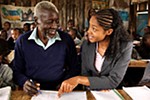 Shadows off the beaten path
Shadows off the beaten pathTHE FIRST GRADER | WE ARE WHAT WE ARE
< < F O R E I G N > >
last update 7.Nov.10
See also: SHADOWS FILM FESTIVAL
 R E V I E W B Y R I C H C L I N E
R E V I E W B Y R I C H C L I N E À Deriva
À Deriva
prd Andrea Barata Ribeiro, Bel Berlinck
with Vincent Cassel, Laura Neiva, Camilla Belle, Caua Reymond, Debora Bloch, Max Huzar, Izadora Armelin, Daniel Passi, Gregorio Duvivier, Thomas Huszar, Josefina Schiller, Gabriela Flarys
 release Br 31.Jul.09,
release Br 31.Jul.09, UK 19.Nov.10
09/Brazil 1h37
CANNES FILM FEST

 Shot with a warm, sun-drenched glow, this drama practically purrs with the sexuality of its characters. Although since the story's told from a teenager's perspective, it doesn't always get things right.
Shot with a warm, sun-drenched glow, this drama practically purrs with the sexuality of its characters. Although since the story's told from a teenager's perspective, it doesn't always get things right.
In 1980s Brazil, struggling author Mathias (Cassel) is on a beach holiday with his wife Clarice (Bloch) and their three children. The eldest, 14-year-old Filipa (Neiva), isn't quite aware of the tension between her parents, so when she discovers that her beloved dad is having an affair with an American woman (Belle), she's furious. She of course feels much more grown-up than she is. And while trying to figure out how to confront her father, she starts flirting with Artur (Passi), who clearly loves her, and other men too.
The film's early section is a fascinating mix of gorgeous beaches, tanned skin and a realistically tight family underscored with honest pain. But when things start turning serious, the plot begins to collapse, starting with the discovery of a gun, perhaps cinema's most overused plot device. Not to mention the fact that these people simply refuse to actually communicate. What follows feels increasingly like a thriller as there's a murder on the beach and Filipa plots against her father. Things also heat up with both Artur and a hunky barman (Reymond).
This is a story about how children can't possibly understand the subtleties of an adult world, and Dhalia lays this on a bit thickly as the film progresses. Fortunately he also fills each scene with earthy realism as these teens start tapping into urges they haven't a clue how to control. At the centre is a collision of love, respect and hate - three emotions that often cause the same effect. But is it true that children can't understand these things?
What makes this film gripping is the complexity of these emotions. Whether they ring true or not, it's thoroughly compelling to watch. Cassel is as effortlessly excellent as always, quietly showing that Mathias isn't nearly as in control as he thinks he is. Meanwhile, Neiva delivers a remarkably transparent debut performance. And ultimately the real message is that these things feel like the end of the world to us. But they're not.
23.Oct.09 lff
 R E V I E W B Y R I C H C L I N E
R E V I E W B Y R I C H C L I N E
scr Pang Ho-Cheung, Derek Tsang, Jimmy Wan
prd Conroy Chan, Josie Ho, Subi Liang
with Josie Ho, Eason Chan, Derek Tsang, Lawrence Chou, Juno Mak, Michelle Ye, Norman Chui Siu Keung, Paw Hee Ching, Lo Hoi Pang, Wong Ching, Sinn Lap Man, Felix Lok

release US Apr.10 tff,
HK 13.May.10, UK 19.Nov.10
10/China 1h36
 Supposedly based on a true story, this film feels more like an extended joke, complete with a punch line that comes after 90 minutes of outrageous grisliness. At least it's blackly funny. And eerily relevant.
Supposedly based on a true story, this film feels more like an extended joke, complete with a punch line that comes after 90 minutes of outrageous grisliness. At least it's blackly funny. And eerily relevant.
Since she was a child, Sheung (Ho) has been incensed by the injustice of the Hong Kong property market, which has only become worse over the years. After a tall block is built in front of her harbour view, she vows to buy a flat in the new building. But even working two full-time jobs isn't enough. With her father in need of expensive medical treatment, she decides to take matters into her own hands, even if it means murder.
This story is told out of sequence and crosscut with Sheung's grisly rampage of murder as she moves through a series of apartments killing people in hideous ways. We're not sure why she's doing this until the the final piece of the story falls into place. And the problem with this structure is that we can't sympathise without knowing her motivation, so the film becomes merely a display of exceptionally effective horror make-up effects.
Since we haven't a clue what's happening or why, we never feel like we know Sheung, which leaves Ho's performance feeling rather empty. Still, her physicality is impressive as she gets out of dangerous situations by focussing her inner rage on whoever's in front of her. As the body count climbs, we hope someone stops her. And even the scenes from previous years don't really help, confusing the narrative since they feel so random.
Along the way there are constant discussions about housing and finance. Everyone's talking about the high cost of property, government collusion with developers and, underlying it all, the unfaithfulness of men. All of these things have an impact on the story, but the real point of the film is to show a lot of horrible ways to die with as much blood and gore as possible. And while director Pang shoots it with a lot of visual panache, just a bit more pathos would have made all the difference.
229.Sep.10
 R E V I E W B Y R I C H C L I N E
R E V I E W B Y R I C H C L I N E
scr Ann Peacock
prd Sam Feuer, Richard Harding, David M Thompson
with Naomie Harris, Oliver Musila Litondo, Tony Kgoroge, Alfred Munyua, Shoki Mokgapa, Vusumuzi Michael Kunene, Agnes Simaloi, Kamau Mbaya, Lwander Jawar, Emily Njoki, Dan Churchill Ndambuki

release UK 24.Jun.11
10/Kenya BBC 1h43
TORONTO FILM FEST

 Based on a true story, this drama from Kenya reflects on the legacy of colonialism and tribal warfare in a nation trying to get its feet on the ground. It's a fairly straightforward film, and it's also a real crowd-pleaser.
Based on a true story, this drama from Kenya reflects on the legacy of colonialism and tribal warfare in a nation trying to get its feet on the ground. It's a fairly straightforward film, and it's also a real crowd-pleaser.
As the government introduces free education for all, 84-year-old Maruge (Litondo) shows up at primary school hoping to learn to read. Head teacher Jane (Harris) takes him in, knowing that she'll get in trouble with her boss (Kunene) but never suspecting that Maruge's story will ripple around the world. Maruge is a Kikuyu who fought with the Mau Maus against British colonialism in the 1950s, when he was imprisoned and viciously tortured. And there are still old wounds between him and those he saw as collaborators.
While the grim past gives the film a dark undercurrent, the central story is warm and sentimental, as Maruge bonds with his much-younger fellow students and takes a stand for the importance of education. It's lovely to watch his infectious joy fill the school, as his yearning for education lights up even this boisterous classroom. Meanwhile, dark antagonism swirls outside the gates (and among a few disgruntled teachers), building a real sense of menace from a growing mob mentality.
Against this we see in flashbacks Maruge's life as a young man (Jawar), reliving the horrific violence he and his wife (Kjoki) suffered. These scenes of radicalised youth and terrified uniformed officials have real resonance in today's world, although the filmmakers slightly play this down in lieu of a positive message about perseverance and reconciliation. Still, the repeated shots of Maruge's face in sweaty, terrified close-up put us into his mind very effectively. So we really feel the injustice as he is unable to put the past behind him.
The performances are very strong across the board. Even if the characters aren't particularly complex, they are believable and engaging. Harris and Litondo are a terrific central double-act, and the children are simply wonderful on screen. So if the underlying nastiness boils over into a satisfying, sentimental final sequence, we don't mind too much. The filmmakers make their hard point, then leave us with a smile.
27.Oct.10 lff
 R E V I E W B Y R I C H C L I N E
R E V I E W B Y R I C H C L I N E Somos lo Que Hay
Somos lo Que Hay
prd Nicolas Celis
with Francisco Barreiro, Alan Chavez, Paulina Gaitan, Carmen Beato, Jorge Zarate, Esteban Soberanes, Miguel Angel Hoppe, Daniel Gimenez Cacho, Adrian Aguirre, Miriam Balderas, Raul Kennedy, Humberto Yanez

release US Oct.10 nyff,
UK 12.Nov.10
10/Mexico 1h30
CANNES FILM FEST

 For a thriller about cannibals, this Mexican film is more of an unsettlingly violent drama than an all-out horror movie. It's often very grisly, but has a fine sense of visual style and an extremely black streak of comedy.
For a thriller about cannibals, this Mexican film is more of an unsettlingly violent drama than an all-out horror movie. It's often very grisly, but has a fine sense of visual style and an extremely black streak of comedy.
When their father dies, three late-teen children aren't sure how to help their mother Patricia (Beato). The eldest, Alfredo (Barreiro) thinks she can take care of herself, as he doesn't want to inherit the provider role. And we understand why, since the job entails bringing people home for dinner. As in eating them. Hothead brother Julian (Chavez) has a bit more skill at this job, but sister Sabina (Gaitan) insists that it's Alfredo's inherited role. Meanwhile, a couple of cops are closing in.
Filmmaker Grau hooks us with quiet, invitingly bleak imagery and bone-dry humour. The grisliness is also pretty full-on from the start, but what makes it mesmerising is the precise camera work, which playfully uses reflections, colours, depth of field, focus and offbeat angles to keep us on our toes. And the sound mix is just as intriguing. All of this is in service of a story so thoroughly unhinged that we can't avert our gaze.
The constant suspense is also completely unpredictable. We never know what's going to happen within a scene, mainly because Alfredo is so jumpy and Julian so pushy. And Patricia and Sabina are forces to reckon with as well. The cast members invest these people not only with jagged personalities but also layers of internal emotions that continually catch us off guard (Patricia doesn't want to eat prostitutes; Julian won't eat a gay man). The brotherly rivalry and camaraderie are both intense, as is the sense that the whole family is on a kind of adventure after the death of their father.
As the story progresses it gets increasingly blunt and brutal. But then, this family is going to have to be brazen if it's going to survive. As the action builds to the frenzied climax, we actually begin to hope that they'll survive to carry on with their private rituals. And the fact that the filmmakers can make us feel this is seriously impressive.
11.Oct.10


See also: SHADOWS FILM FESTIVAL
© 2010 by Rich Cline, Shadows
on the Wall